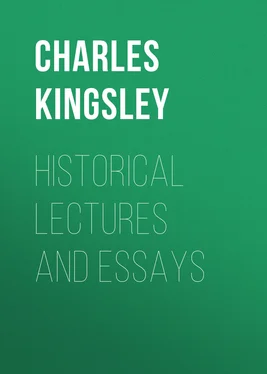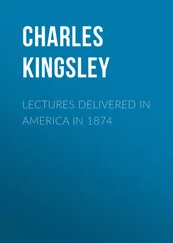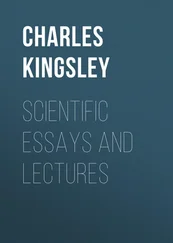Charles Kingsley - Historical Lectures and Essays
Здесь есть возможность читать онлайн «Charles Kingsley - Historical Lectures and Essays» — ознакомительный отрывок электронной книги совершенно бесплатно, а после прочтения отрывка купить полную версию. В некоторых случаях можно слушать аудио, скачать через торрент в формате fb2 и присутствует краткое содержание. Жанр: foreign_prose, История, foreign_edu, foreign_antique, на английском языке. Описание произведения, (предисловие) а так же отзывы посетителей доступны на портале библиотеки ЛибКат.
- Название:Historical Lectures and Essays
- Автор:
- Жанр:
- Год:неизвестен
- ISBN:нет данных
- Рейтинг книги:5 / 5. Голосов: 1
-
Избранное:Добавить в избранное
- Отзывы:
-
Ваша оценка:
- 100
- 1
- 2
- 3
- 4
- 5
Historical Lectures and Essays: краткое содержание, описание и аннотация
Предлагаем к чтению аннотацию, описание, краткое содержание или предисловие (зависит от того, что написал сам автор книги «Historical Lectures and Essays»). Если вы не нашли необходимую информацию о книге — напишите в комментариях, мы постараемся отыскать её.
Historical Lectures and Essays — читать онлайн ознакомительный отрывок
Ниже представлен текст книги, разбитый по страницам. Система сохранения места последней прочитанной страницы, позволяет с удобством читать онлайн бесплатно книгу «Historical Lectures and Essays», без необходимости каждый раз заново искать на чём Вы остановились. Поставьте закладку, и сможете в любой момент перейти на страницу, на которой закончили чтение.
Интервал:
Закладка:
and so forth, improvising after the old Norse fashion. Then Thormod got up and went to the fire, and stood and warmed himself. And the nurse-girl said to him, “Go out, man, and bring some of the split-firewood which lies outside the door.” He went out and brought an armful of wood and threw it down. Then the nurse-girl looked him in the face, and said, “Dreadful pale is this man. Why art thou so?” Then sang Thormod:
“Thou wonderest, sweet bloom, at me,
A man so hideous to see.
The arrow-drift o’ertook me, girl,
A fine-ground arrow in the whirl
Went through me, and I feel the dart
Sits, lovely lass, too near my heart.”
The girl said, “Let me see thy wound.” Then Thormod sat down, and the girl saw his wounds, and that which was in his side, and saw that there was a piece of iron in it; but could not tell where it had gone. In a stone pot she had leeks and other herbs, and boiled them, and gave the wounded man of it to eat. But Thormod said, “Take it away; I have no appetite now for my broth.” Then she took a great pair of tongs and tried to pull out the iron; but the wound was swelled, and there was too little to lay hold of. Now said Thormod, “Cut in so deep that thou canst get at the iron, and give me the tongs.” She did as he said. Then took Thormod the gold bracelet off his hand and gave it the nurse-girl, and bade her do with it what she liked.
“It is a good man’s gift,” said he. “King Olaf gave me the ring this morning.”
Then Thormod took the tongs and pulled the iron out. But on the iron was a barb, on which hung flesh from the heart, some red, some white. When he saw that, he said, “The king has fed us well. I am fat, even to the heart’s roots.” And so leant back and was dead.
CYRUS, THE SERVANT OF-THE LORD 4 4 This lecture was given in America in 1874.
I wish to speak to you to-night about one of those old despotic empires which were in every case the earliest known form of civilisation. Were I minded to play the cynic or the mountebank, I should choose some corrupt and effete despotism, already grown weak and ridiculous by its decay—as did at last the Roman and then the Byzantine Empire—and, after raising a laugh at the expense of the old system say: See what a superior people you are now—how impossible, under free and enlightened institutions, is anything so base and so absurd as went on, even in despotic France before the Revolution of 1793. Well, that would be on the whole true, thank God; but what need is there to say it?
Let us keep our scorn for our own weaknesses, our blame for our own sins, certain that we shall gain more instruction, though not more amusement, by hunting out the good which is in anything than by hunting out its evil. I have chosen, not the worst, but the best despotism which I could find in history, founded and ruled by a truly heroic personage, one whose name has become a proverb and a legend, that so I might lift up your minds, even by the contemplation of an old Eastern empire, to see that it, too, could be a work and ordinance of God, and its hero the servant of the Lord. For we are almost bound to call Cyrus, the founder of the Persian Empire, by this august title for two reasons—First, because the Hebrew Scriptures call him so; the next, because he proved himself to be such by his actions and their consequences—at least in the eyes of those who believe, as I do, in a far-seeing and far-reaching Providence, by which all human history is
Bound by gold chains unto the throne of God.
His work was very different from any that need be done, or can be done, in these our days. But while we thank God that such work is now as unnecessary as impossible; we may thank God likewise that, when such work was necessary and possible, a man was raised up to do it: and to do it, as all accounts assert, better, perhaps, than it had ever been done before or since.
True, the old conquerors, who absorbed nation after nation, tribe after tribe, and founded empires on their ruins, are now, I trust, about to be replaced, throughout the world, as here and in Britain at home, by free self-governed peoples:
The old order changeth, giving place to the new;
And God fulfils Himself in many ways,
Lest one good custom should corrupt the world.
And that custom of conquest and empire and transplantation did more than once corrupt the world. And yet in it, too, God may have more than once fulfilled His own designs, as He did, if Scripture is to be believed, in Cyrus, well surnamed the Great, the founder of the Persian Empire some 2400 years ago. For these empires, it must be remembered, did at least that which the Roman Empire did among a scattered number of savage tribes, or separate little races, hating and murdering each other, speaking different tongues, and worshipping different gods, and losing utterly the sense of a common humanity, till they looked on the people who dwelt in the next valley as fiends, to be sacrificed, if caught, to their own fiends at home. Among such as these, empires did introduce order, law, common speech, common interest, the notion of nationality and humanity. They, as it were, hammered together the fragments of the human race till they had moulded them into one. They did it cruelly, clumsily, ill: but was there ever work done on earth, however noble, which was not—alas, alas!—done somewhat ill?
Let me talk to you a little about the old hero. He and his hardy Persians should be specially interesting to us. For in them first does our race, the Aryan race, appear in authentic history. In them first did our race give promise of being the conquering and civilising race of the future world. And to the conquests of Cyrus—so strangely are all great times and great movements of the human family linked to each other—to his conquests, humanly speaking, is owing the fact that you are here, and I am speaking to you at this moment.
It is an oft-told story: but so grand a one that I must sketch it for you, however clumsily, once more.
In that mountain province called Farsistan, north-east of what we now call Persia, the dwelling-place of the Persians, there dwelt, in the sixth and seventh centuries before Christ, a hardy tribe, of the purest blood of Iran, a branch of the same race as the Celtic, Teutonic, Greek, and Hindoo, and speaking a tongue akin to theirs. They had wandered thither, say their legends, out of the far north-east, from off some lofty plateau of Central Asia, driven out by the increasing cold, which left them but two mouths of summer to ten of winter.
They despised at first—would that they had despised always!—the luxurious life of the dwellers in the plains, and the effeminate customs of the Medes—a branch of their own race who had conquered and intermarried with the Turanian, or Finnish tribes; and adopted much of their creed, as well as of their morals, throughout their vast but short-lived Median Empire. “Soft countries,” said Cyrus himself—so runs the tale—“gave birth to small men. No region produced at once delightful fruits and men of a war-like spirit.” Letters were to them, probably, then unknown. They borrowed them in after years, as they borrowed their art, from Babylonians, Assyrians, and other Semitic nations whom they conquered. From the age of five to that of twenty, their lads were instructed but in two things—to speak the truth and to shoot with the bow. To ride was the third necessary art, introduced, according to Xenophon, after they had descended from their mountain fastnessess to conquer the whole East.
Their creed was simple enough. Ahura Mazda—Ormuzd, as he has been called since—was the one eternal Creator, the source of all light and life and good. He spake his word, and it accomplished the creation of heaven, before the water, before the earth, before the cow, before the tree, before the fire, before man the truthful, before the Devas and beasts of prey, before the whole existing universe; before every good thing created by Ahura Mazda and springing from Truth.
Читать дальшеИнтервал:
Закладка:
Похожие книги на «Historical Lectures and Essays»
Представляем Вашему вниманию похожие книги на «Historical Lectures and Essays» списком для выбора. Мы отобрали схожую по названию и смыслу литературу в надежде предоставить читателям больше вариантов отыскать новые, интересные, ещё непрочитанные произведения.
Обсуждение, отзывы о книге «Historical Lectures and Essays» и просто собственные мнения читателей. Оставьте ваши комментарии, напишите, что Вы думаете о произведении, его смысле или главных героях. Укажите что конкретно понравилось, а что нет, и почему Вы так считаете.












